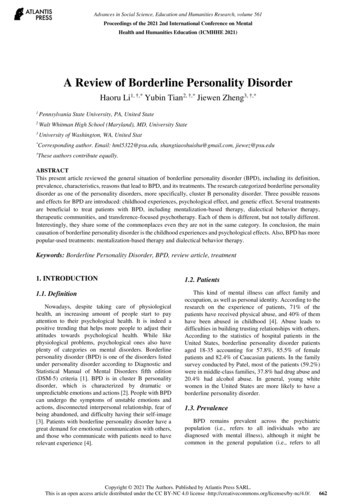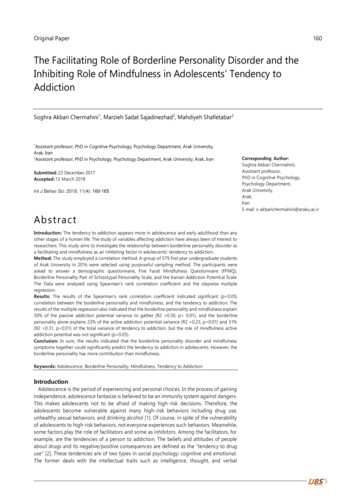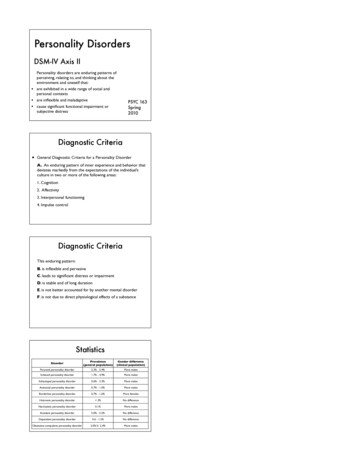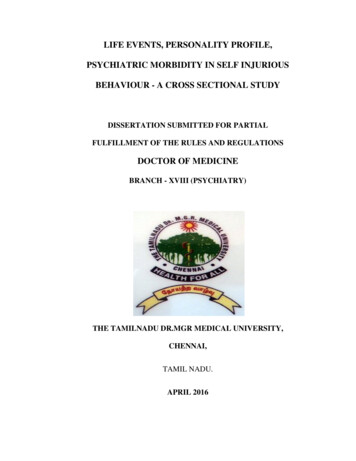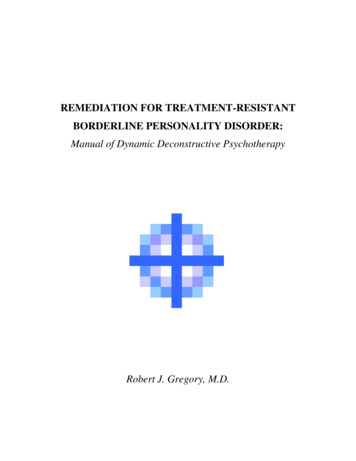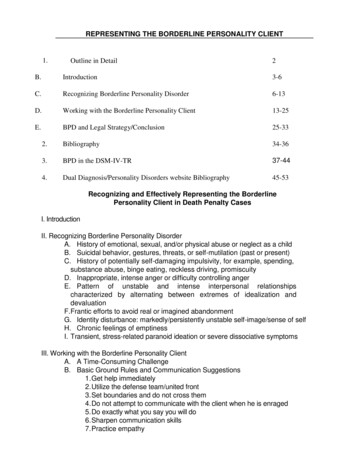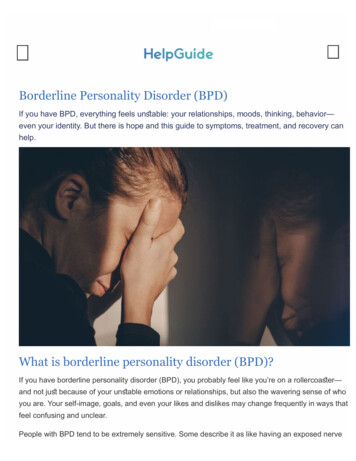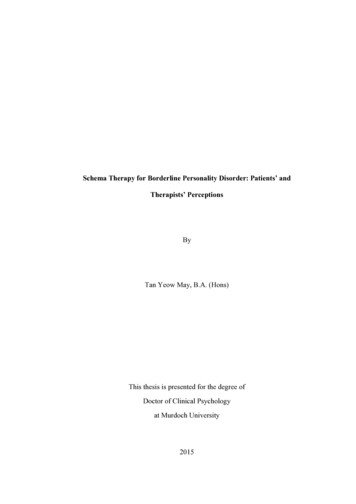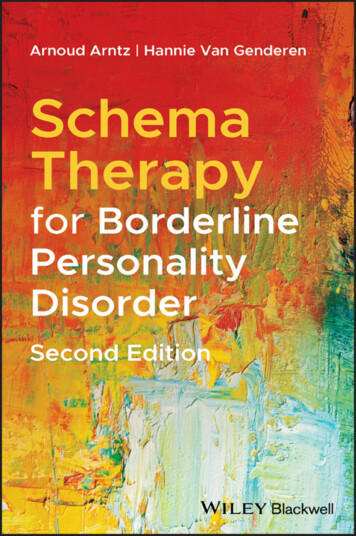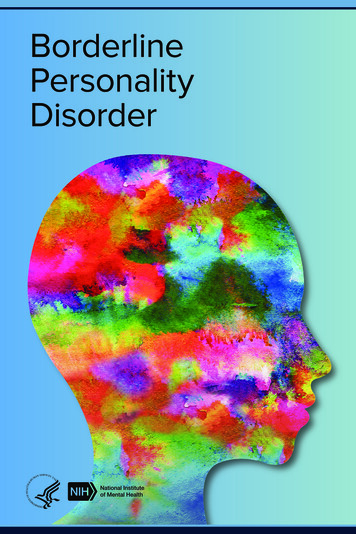
Transcription
BorderlinePersonalityDisorder
What is borderline personality disorder?Borderline personality disorder is a mental illness that severely impacts aperson’s ability to regulate their emotions. This loss of emotional control canincrease impulsivity, affect how a person feels about themselves, andnegatively impact their relationships with others. Effective treatments areavailable to manage the symptoms of borderline personality disorder. Learnmore about the disorder, how it’s diagnosed, and how to find support.What are the signs and symptoms?People with borderline personality disorder may experience intense moodswings and feel uncertainty about how they see themselves. Their feelings forothers can change quickly, and swing from extreme closeness to extreme dislike.These changing feelings can lead to unstable relationships and emotional pain.People with borderline personality disorder also tend to view things in extremes,such as all good or all bad. Their interests and values can change quickly, andthey may act impulsively or recklessly.Other signs or symptoms may include: Efforts to avoid real or perceived abandonment, such as plunging headfirstinto relationships—or ending them just as quickly. A pattern of intense and unstable relationships with family, friends, andloved ones. A distorted and unstable self-image or sense of self. Impulsive and often dangerous behaviors, such as spending sprees, unsafesex, substance abuse, reckless driving, and binge eating. Please note: If thesebehaviors happen mostly during times of elevated mood or energy, they maybe symptoms of a mood disorder and not borderline personality disorder. Self-harming behavior, such as cutting. Recurring thoughts of suicidal behaviors or threats. Intense and highly variable moods, with episodes lasting from a few hoursto a few days. Chronic feelings of emptiness. Inappropriate, intense anger or problems controlling anger. Feelings of dissociation, such as feeling cut off from oneself, observingoneself from outside one’s body, or feelings of unreality.
Not everyone with borderline personality disorder may experience all of thesesymptoms. The severity, frequency, and duration of symptoms depend on theperson and their illness.People with borderline personality disorder have a significantly higher rateof self-harming and suicidal behavior than the general population.People with borderline personality disorder who are thinking of harmingthemselves or attempting suicide need help right away.If you or someone you know is in immediate distress or is thinking abouthurting themselves, call the National Suicide Prevention Lifeline toll-freeat 1-800-273-TALK (8255). You also can text the Crisis Text Line (HELLO to741741) or use the Lifeline Chat on the National Suicide Prevention Lifelinewebsite at https://suicidepreventionlifeline.org.What causes borderline personality disorder?Researchers aren’t sure what causes borderline personality disorder, but studiessuggest that genetic, environmental, and social factors may increase the riskof developing it. These factors may include: Family history: People who have a close family member (such as a parentor sibling) with the illness may be at a higher risk of developing borderlinepersonality disorder. Brain structure and function: Research shows that people with borderlinepersonality disorder may have structural and functional changes in thebrain, especially in the areas that control impulses and emotion regulation.However, the studies do not demonstrate whether these changes were riskfactors for the illness or if such changes were caused by the disorder. Environmental, cultural, and social factors: Many people with borderlinepersonality disorder report experiencing traumatic life events, such asabuse, abandonment, or hardship during childhood. Others may have beenexposed to unstable, invalidating relationships or conflicts.Although these factors may increase a person’s risk, it doesn’t mean it iscertain that they’ll develop borderline personality disorder. Likewise, peoplewithout these risk factors may develop the disorder in their lifetime.
How is borderline personality disorder diagnosed?A licensed mental health professional—such as a psychiatrist, psychologist, orclinical social worker—who is experienced in diagnosing and treating mentaldisorders can diagnose borderline personality disorder based on a thoroughinterview and a discussion about symptoms. A careful and thorough medicalexam also can help rule out other possible causes of symptoms. In diagnosingthe illness, providers will discuss a person’s symptoms and ask about familymedical histories, including histories of mental illness.Borderline personality disorder is usually diagnosed in late adolescence orearly adulthood. Occasionally, a person younger than age 18 may bediagnosed with borderline personality disorder if symptoms are significantand last at least a year.What other illnesses can co-occur with borderlinepersonality disorder?Borderline personality disorder often occurs with other mental illnesses, suchas post-traumatic stress disorder (PTSD). These co-occurring disorders can makeit harder to diagnose and treat borderline personality disorder, especially ifsymptoms of other illnesses overlap with symptoms of the disorder. Forexample, a person with borderline personality disorder also may be morelikely to experience symptoms of major depression, PTSD, bipolar disorder,anxiety disorders, substance abuse, or eating disorders.How is borderline personality disorder treated?Borderline personality disorder historically has been viewed as challenging totreat. But with newer, evidence-based treatment, many people with this disorderexperience fewer and less severe symptoms, improved functioning, and betterquality of life. It is important for patients with borderline personality disorder toreceive treatment from a licensed mental health professional. Other types oftreatment, or treatment from a provider who is not appropriately trained, may beineffective or dangerous.Many factors affect the length of time it takes for symptoms to improve oncetreatment begins. It is important for people with borderline personality disorderand their loved ones to be patient and receive support during treatment.It is important to seek—and stick with—treatment.
Studies funded by the National Institute of Mental Health (NIMH) indicate thatindividuals with borderline personality disorder who don’t receive adequatetreatment are more likely to develop other chronic medical or mental illnessesand are less likely to make healthy lifestyle choices.PsychotherapyPsychotherapy, sometimes called “talk therapy,” is the first-line treatment forpeople with borderline personality disorder. Most psychotherapy occurs witha licensed, trained mental health professional in one-on-one sessions or withother individuals in group settings. Group sessions may help teach peoplewith borderline personality disorder to interact with others and expressthemselves effectively.Two examples of psychotherapies used to treat borderline personalitydisorder are: Dialectical Behavior Therapy (DBT): This treatment was developedspecifically for individuals with borderline personality disorder. DBT usesconcepts of mindfulness or awareness of one’s present situation andemotional state. DBT also teaches skills to help people control intenseemotions, reduce self-destructive behaviors, and improve relationships. Cognitive Behavioral Therapy (CBT): This treatment can help peopleidentify and change core beliefs and behaviors that come from inaccurateperceptions of themselves and others and problems interacting withothers. It may help people reduce mood swings and anxiety symptoms andmay reduce the number of self-harming or suicidal behaviors.Read more on NIMH’s Psychotherapies health topic page use the benefits of prescription medication for borderline personalitydisorder are unclear, medications aren’t typically used as the primary way totreat the illness. However, in some cases, a psychiatrist may recommendmedications to treat specific symptoms or co-occurring mental disorders suchas mood swings or depression. Treatment with medications may requirecoordinated care from more than one medical professional.Medications also can sometimes cause side effects in some people.Talk to your provider about what to expect from a particular medication.Read more on NIMH’s Mental Health Medications health topic page atwww.nimh.nih.gov/medications.
Where can I find help?If you’re not sure where to get help, a health care provider can refer you toa licensed mental health professional, such as a psychiatrist or psychologistwith experience treating borderline personality disorder. If you need helpstarting the conversation, check out the Tips for Talking With Your HealthCare Provider fact sheet at www.nimh.nih.gov/talkingtips.Other resources include: Substance Abuse and Mental Health Services Administration’sBehavioral Health Treatment Services Locator, a tool for finding mentalhealth services in your area: https://findtreatment.samhsa.gov NIMH’s Help for Mental Illnesses webpage: www.nimh.nih.gov/findhelp Agency for Healthcare Research and Quality’s website:www.ahrq.gov/questionsTherapy for Caregivers and Family MembersHaving a relative or loved one with the disorder can be stressful, and familymembers or caregivers may unintentionally act in ways that can worsen theirloved one’s symptoms.Although more research is needed to determine how well family therapy helpswith borderline personality disorder, studies on other mental disorders showthat including family members can help support a person’s treatment. Familiesand caregivers also can benefit from therapy.Family therapy helps because: It allows the relative or loved one to develop skills to understand andsupport a person with borderline personality disorder. Focusing on the needs of family members helps them understand theobstacles and strategies for caring for someone with the disorder.
How can I help a friend or family member withborderline personality disorder?Here are some ways to help a friend or relative with the disorder: Take time to learn about the illness to understand what your friend orrelative is experiencing. Offer emotional support, understanding, patience, and encouragement.Change can be difficult and frightening to people with borderlinepersonality disorder, but things can improve over time. Encourage your loved one in treatment for borderline personality disorderto ask about family therapy. Seek counseling for yourself. Choose a different therapist than the oneyour relative is seeing.How can I learn more about clinical trials studyingborderline personality disorder?NIMH supports a wide range of research, including clinical trials that lookat new ways to prevent, detect, or treat diseases and conditions, includingborderline personality disorder. Although individuals may benefit from beingpart of a clinical trial, participants should be aware that the primary purpose ofa clinical trial is to gain new scientific knowledge so that others may be betterhelped in the future.Researchers at NIMH and around the country conduct clinical trials withpatients and healthy volunteers. Talk to a health care provider about clinicaltrials, their benefits and risks, and whether one is right for you. For moreinformation, visit www.nimh.nih.gov/clinicaltrials.
ReprintsThis publication is in the public domain and may be reproduced or copiedwithout permission from NIMH. We encourage you to reproduce and use NIMHpublications in your efforts to improve public health. If you do use our materials,we request that you cite the National Institute of Mental Health. To learn moreabout using NIMH publications, refer to www.nimh.nih.gov/reprints.For More InformationNIMH websitewww.nimh.nih.govwww.nimh.nih.gov/espanol (en español)MedlinePlus (National Library of s.gov/spanish (en ttps://salud.nih.gov/investigacion-clinica (en español)National Institute of Mental HealthOffice of Science Policy, Planning, and Communications6001 Executive BoulevardRoom 6200, MSC 9663Bethesda, MD 20892-9663Toll-free: 1-866-615-6464Email: nimhinfo@nih.govWebsite: www.nimh.nih.govU.S. DEPARTMENT OF HEALTH AND HUMAN SERVICESNational Institutes of HealthNIH Publication No. 22-MH-4928Revised 2022
Borderline personality disorder historically has been viewed as challenging to treat. But with newer, evidence-based treatment, many people with this disorder experience fewer and less severe symptoms, improved functioning, and better quality of life. It is important for patients with borderline personality disorder to
